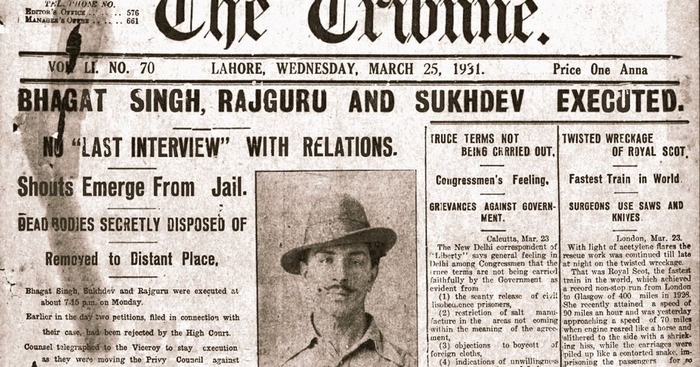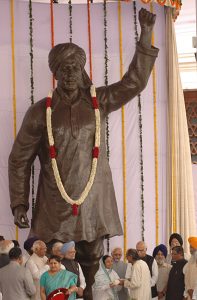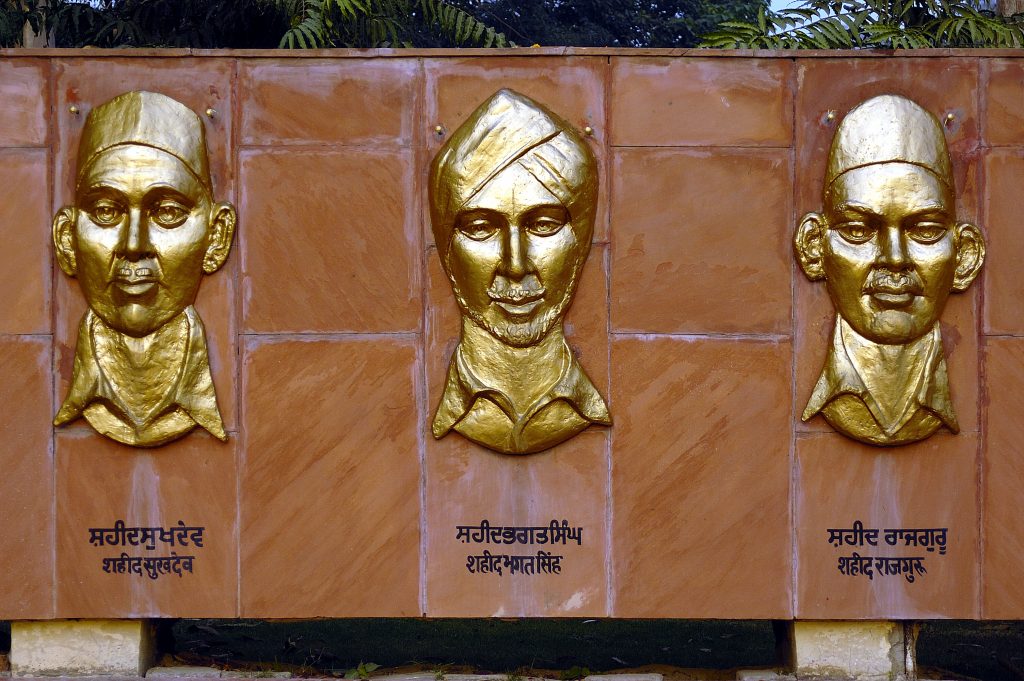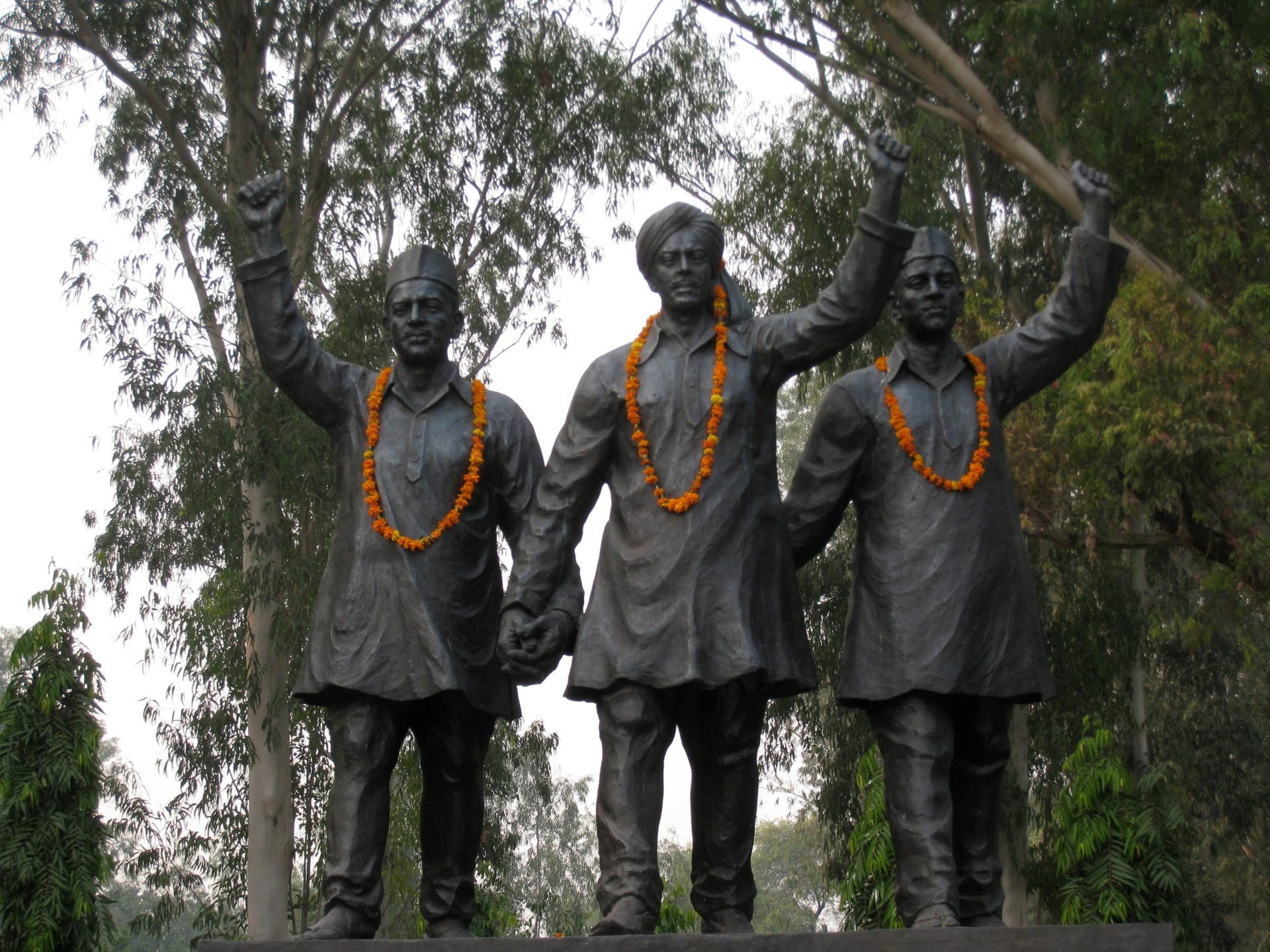by Prof Suresh Sharma
Bhagat Singh was born in a Sikh family in Punjab on 28 September, 1907.
He studied European revolutionary movements as a teenager and was influenced by Marxism. He worked with several revolutionary organisations and became prominent in Hindustan Socialist Republic Association (HSRA) in 1928. Bhagat Singh killed John Saunders, a British police officer, who ordered lathi-charge, in which Lala Lajpat Rai, a prominent Congress leader was killed. Soon after, he and Batukeshwar Dutt threw two bombs and leaflets inside the Central Legislative Assembly and offered themselves for arrest. He gained widespread national support when he undertook a 116-day hunger strike demanding equal rights for European and Indian prisoners. He was convicted and hanged on 23 March, 1931, at the age of 23 years. His legacy remains as an influence on vast section of youth in modern India.
What was the ideology of Bhagat Singh?
With an influence of Marxism, Bhagat Singh was a revolutionary patriot, but before that he was a humanist as is evident from his writings. He wished to see a society, which was free from all kinds of exploitation and injustice, and not just freedom from British. He was an atheist and was strongly opposed to communalism. As a revolutionary, he was not very averse to using violence, but he had massive respect for Gandhiji and non-violence in context of freedom struggle as is evident from documents and his articles.
Was Bhagat Singh a Nationalist?
No, Bhagat Singh was not a nationalist, but a humanist with full credentials of a patriot. It is evident from following points – In the analysis of Nehruji and Netaji and also from the article on ‘Sampradayik Dange Aur Unke Eelaj’, where he calls upon youth to be humanist and not narrow in their thoughts, it is clear that he was a patriot and not a nationalist. In his book, ‘Why I am an Atheist’, Bhagat Singh explains how his struggle was not only about getting rid of whites (British) and handing over of the power to blacks (Indians), but it is for the social change, including liberation of working class and deprived sections, like workers, farmers, etc. from exploitation and their miseries.
What were thoughts of Bhagat Singh on Communalism?
In an article titled ‘Sampardayik Dange aur Unke Eelaj’ published in ‘Kirti’ in June, 1928, Bhagat Singh wrote – “These ‘religions’ have ruined India and don’t know when would India get rid of these communal riots. These riots have defamed India in the eyes of world. And we see that these superstitions drown all in it. Rarely, a Hindu, a Muslim or a Sikh would keep his cool. Rest all take up sticks, swords and daggers, and kill each other in the name of their religion.
About Press – “The second gentlemen, who play a special role in flaming these communal riots, are press people. The profession of journalism that was thought to be pious has got dirty today. These guys write big titles against each other to instigate riots and make people kill each other.”
For Youth – “We have got to hear the good news that the youth of India are fed up and are now breaking away from such religions that teach us to hate each other. They are open enough that they see all as human being, then Indian and not as a Hindu, Muslim or Sikh. These thoughts of youth suggest that India has a golden future. Indians should not get scared of these riots, but must prepare themselves and try to avert such conditions that cause riots.”
What Bhagat Singh thought about Casteism?
He was strongly against casteism. In his newspaper, ‘Kirti’, he wrote in June 1928 –
“Our country is unique, where six crore citizens are called untouchables and their mere touch defiles the upper castes. Gods get enraged if they enter the temples. It is shameful that such things are being practiced in the twentieth century.” Calling this practice a hypocrisy, he wrote – “We claim to be a spiritual country but hesitate to accept equality of all human beings….We are angry about discrimination against Indians in foreign lands and complain that the English do not give us equal rights in India,” questioning if Indians really had any right to complain.”
What Bhagat Singh thought about Congress leaders?
Bhagat Singh’s father, Kishen Singh spoke to loudly weeping delegates of Congress Adhiveshan in Lahore, immediately after Bhagat Singh’s execution – “Bhagat Singh told me not to worry. Let me be hanged. But he made a fervent appeal: ‘You must support your general (Gandhi). You must support all Congress leaders. Only then will you be able to win independence for the country.”
In his jail diary, Bhagat Singh mentions Pandit Nehru and Netaji Bose as a ‘redeeming feature of the freedom struggle’. In 1928, Bhagat Singh, wrote in an article titled ‘Naye Netaon ke Alag-Alag Vichar’, published in the journal Kirati pronounces Bose as an emotional leader, a devotee of the ancient culture of India, and regards Nehru to be an internationalist. In his view, Bose is a soft-hearted romantic and Nehru a revolutionary. Bose wants freedom from the British, while Nehru believes that complete independence & self-rule is must for change in social system.
Bhagat Singh says that for Bose, international politics matters only to the extent that it addresses the question of India’s defence and its development. On the other hand, Nehru has come out of the narrow confines of nationalism and into the open fields of internationalism. He said “Panjabi youth should go with him [Nehru] to understand the real meaning of revolution… The youth should firm up their thought so that in the times of dejection and defeat they do not get deviated.”
How was the relation between Bhagat Singh and Congress?
The relationship between Congress and Bhagat Singh could be understood from following –
• After the rejection of the appeal to the Privy Council, the Congress Party President Madan Mohan Malviya filed a mercy appeal before Irwin on 14 February 1931.
• Jawaharlal Nehru met Bhagat Singh and others in Mianwali jail. After the meeting, he stated – “I was very much pained to see the distress of the heroes. They have staked their lives in this struggle. They want that political prisoners should be treated equally. I am quite hopeful that their sacrifice would be crowned with success.”
• Congress party passed a resolution requesting Bhagat Singh to end his 116-days long hunger strike, which he honoured ending fast on 5 October 1929.
• Before his hanging, Bhagat Singh asked his lawyer, Pran Nath Mehta, to convey his thanks to Pandit Nehru and Subhas Chandra Bose for their support.

RSS/BJP say that Gandhiji did not make efforts to save Bhagat Singh – is it true?
No, it is a mischief by RSS/BJP to hide the fact that they did nothing for Bhagat Singh. BJP’s founders and RSS had no positive role in freedom struggle. They did everything to sabotage the movement and please British rulers. Now, they try to confuse and divert the people from this fact through such lies.
What efforts did Mahatma Gandhi make to save Bhagat Singh?
Mahatma Gandhi made several efforts for Clemency for Bhagat Singh and his colleagues, as is evident from the facts given below just about last one year –
- 4 May 1930 – Gandhiji wrote to Viceroy criticizing him for creating special Tribunal to try the revolutionaries in Lahore Conspiracy Case, calling it a shortcut for trial of Bhagat Singh.
- Gandhiji was in jail between 5 May, 1930 and 26 January, 1931 for violating Salt Law.
- 31 January, 1931 – At Allahabad, Gandhiji speaking on the subject of Bhagat Singh’s execution said – leave alone hanging, they should not even be kept in prison.
- 14 February, 1931 – Gandhiji sent his secretary, Mahadev Desai to Tej Bahadur Sapru, Srinivas Sastri and M.R. Jayakar to seek their help to prevent hanging of Bhagat Singh.
- 18 February, 1931 – During Gandhi-Irwin Pact, Gandhiji told Lord Arwin – “If you want to make present atmosphere more favourable, you should suspend Bhagat Singh’s execution”.
- 7 March, 1931 – “I cannot in all conscience agree to anyone being sent to gallows, much less a brave man like Bhagat Singh.”
- 20 March,1931 – Gandhi had a long conversation with the Home Secretary, Herbert Emerson in connection with Bhagat Singh.
- 21 March 1931 – Gandhi postponed his departure for Karachi Congress for a day to meet Viceroy Irwin and request him to reconsider impending executions.
- 21 March, 1931 – Gandhi redrafted petition prepared by Asaf Ali as from Bhagat Singh, keeping with his self-respect. Asaf Ali took this draft to Lahore.
- 22 March, 1931 – Gandhi met Irwin yet again to discuss the issue. The Viceroy promised to consider Gandhi’s submission.
- 23 March, 1931 – Gandhi woke up at 1.00 am and wrote to Viceroy, addressing him as dear friend, for the commutation of the death sentence citing public opinion, internal peace, offer of revolutionaries to shed violence, his own position, the possibility of a judicial error and the appeal to the Christian sentiments of Lord Irwin.
- 29 March 1931 – Gandhi wrote in Young India – “Bhagat Singh and his two associates have been hanged. The Congress made many attempts to save their lives and the Government entertained many hopes of it, but all has been in a vain. Bhagat Singh did not wish to live. He refused to apologise, or even file an appeal. Bhagat Singh was not a devotee of non-violence, but he did not subscribe to the religion of violence. He took to violence due to helplessness and to defend his homeland. In his last letter, Bhagat Singh wrote, ‘I have been arrested while waging a war. For me there can be no gallows. Put me into the mouth of cannon and blow me off.’ These heroes had conquered the fear of death. Let us bow to them a thousand times for their heroism.”
- It is also fact that Mr. Pran Nath Mehta, the advocate of Bhagat Singh visited him in jail on 20 March, with a draft-letter for clemency but he declined to sign it. (Ref. Frontline, Volume 18 – Issue 08, Apr. 14 – 27, 2001).
We must ask RSS/BJP people what efforts did their organisation and leaders make for Shaheed Bhagat Singh?
In those days, what others thought about Gandhiji’s help to Bhagat Singh?
Subhas Bose wrote in his work “Indian Struggle” that Gandhiji tried his Very Best for Bhagat Singh and his comrades.
Viceroy Irwin admitted in a speech at Maiden’s Hotel, Delhi three days after the execution of Bhagat Singh that Gandhi had made a forceful request for his Commutation.
In first Biography of Bhagat Singh by J.N. Sanyal, which appeared soon after his execution, the revolutionaries themselves acknowledged Gandhi’s efforts.
What RSS and such organisations actually thought about Bhagat Singh in those days?
M.S. Golwalkar, the most prominent ideologue and Sar-Sanghchalak of RSS (June 1940 to June 1973) in an article titled ‘Martyr, Great but Not Ideal’ wrote in ‘Bunch of Thoughts’ –
“Such persons are not held up as ideals in our society. We have not looked upon their martyrdom as the highest point of greatness to which men should aspire. For, after all, they failed in achieving their ideal, and failure implies some fatal flaw in them.”
Addressing top RSS cadre, Golwalkar said – “Sacrifice does not lead to increase in thinking of society of giving all for the interest of the nation.”- Shri Guruji Samagar Darshan,Vol. I.
The founder and Sar-Sanghchalak of RSS (1925-40), KB Hedgewar said – “Patriotism is not only going to prison. It is not correct to be carried away by such superficial patriotism.” [CP Bhishikar, Sanghavariksh Ke Beej: Dr. Keshavrao Hedgewar, Suruchi]
Balasahab Deoras, third chief of the RSS, narrated an incident – “When Bhagat Singh and his companions were awarded death sentence, at that time our hearts were so excited that some friends together we vowed to do something directly and planned something terrible… We decided to inform Doctorji (Hedgewar) about our decision.. Doctorji took a meeting of ours for discarding this foolish plan and making us to realize the superiority of the work of Sangh.”
Why RSS/BJP try to suggest that Bhagat Singh belonged to them?
Had Bhagat Singh been in present days, he would have been their biggest opponent. Lies and rumours are the integral part of RSS/BJP ideology. There are no instances in history when Bhagat Singh supported or appreciated RSS or Hindu Mahasabha. His article on ‘Sampradayik Dange aur Unke Ilaj’ clearly shows his hate towards communalism. He curses these forces for creating a divide in the society in the name of religion. He actually expresses his optimism in youth for fighting these forces out of the society and calls them to be humanist rather than being communal.
In a different article, ‘Naye Netaon ke Alag Alag Vichar’, he deeply appreciates Pt. Nehru and Netaji Bose for their commitment and vision. Since RSS/BJP has no leader of their own, who could match the stature of the leaders of Congress party, they make efforts to confuse people using names of Bhagat Singh, Sardar Patel, Netaji Bose, Dr. Ambedkar, etc., just for political objectives. In fact, all of them were strong opponents of the ideology of RSS in their times, which is clear from the documents of that time.
There was a basic difference in the character of Shaheed Bhagat Singh and leaders/icons of RSS.
The top icon of RSS, Savarkar opted to file NINE mercy petitions when jailed. Here is the comparison of petitions files by Bhagat Singh and Savarkar –
Petition of Bhagat Singh
…We wanted to point out that according to the verdict of your court we had waged war and were therefore war prisoners. And we claim to be treated as such, i.e., we claim to be shot dead instead of to be hanged.
Petition of Savarkar
…Therefore if the government in their manifold beneficence and mercy release me, I for one cannot but be the staunchest advocate of constitutional progress and loyalty to the English government which is the foremost condition of that progress. As long as we are in jails there cannot be real happiness and joy in hundreds and thousands of homes of His Majesty’s loyal subjects in India, for blood is thicker than water; but if we be released the people will instinctively raise a shout of joy and gratitude to the government, who knows how to forgive and correct, more than how to chastise and avenge. Moreover my conversion to the constitutional line would bring back all those misled young men in India and abroad who were once looking up to me as their guide. I am ready to serve the Government in any capacity they like, for as my conversion is conscientious so I hope my future conduct would be. By keeping me in jail nothing can be got in comparison to what would be otherwise. The Mighty alone can afford to be merciful and therefore where else can the prodigal son return but to the parental doors of the Government?
The following links have extensive information on the Life of Bhagat Singh –
– http://www.shahidbhagatsingh.org/
– https://en.wikipedia.org/wiki/Bhagat_Singh

The President, Smt. Pratibha Patil honoring the renowned Sculptor, Shri Ram V. Sutar who prepared the statue of Shaheed Bhagat Singh, which is unveiled at Parliament House, in New Delhi on August 15, 2008. The Vice President, Shri Mohd. Hamid Ansari, the Speaker, Lok Sabha, Shri Somnath Chatterjee, the Prime Minister, Dr. Manmohan Singh and other dignitaries are also seen.

The National Martyrs Memorial built in 1968 is a memorial for Bhagat Singh, Sukhdev and Rajguru, who were cremated here in 1931 after their execution at the Lahore Jail.
Disclaimer: The opinions expressed within this article are the personal opinions of the author. AlignIndia does not take any responsibility for the content of the article.
Prof Suresh Sharma is a former Jt Director, JNLI, New Delhi


